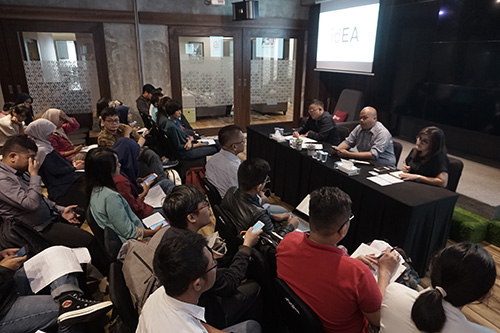Support
Support

Response to PMK 210: Tax Treatments in the Marketplace Can Hamper MSME Growth
Jakarta, January 14, 2019 - The Indonesian e-commerce association (IDEA) regrets the publication of PMK-210 Tax Treatments on Trade Transactions Through Electronic Systems without sufficient socialization and is feared to hinder the growth of MSMEs. For this reason, IDEA and industry players invite stakeholders to find a middle ground in the implementation process. So that it does not turn off the potential of e-commerce as a driver of Indonesia's economic growth.
Other marketplace and e-commerce platforms have recently been considered as opening opportunities for millions of SMEs. This is based on the relative lack of risk offered by the e-commerce platform. Starting from the lack of the need to rent a store, the lack of employees, the promotion costs and the relatively affordable promotional efforts, in addition to the enthusiasm of the people to buy from online platforms that are rapidly increasing. This fact is also supported by the McKinsey study which states that in 2022 online trading will create 26 million jobs both directly and indirectly. Everyday we feel online transportation also provides new choices and opportunities for millions of people to have regular income. We witness how technological breakthroughs have a socio-economic impact and great potential for Indonesia's economic growth.
The majority of MSMEs are Micro
Referring to a study carried out by IDEA in 1765 SMEs in 18 cities in Indonesia, 80 percent of MSME actors were still in the micro category, 15 percent were in the small category, and only 5 percent had been said to enter medium businesses. That is, it is probable that 80 percent of SMEs are still struggling to survive, testing their business models, before they can grow their business.
idEA sees that the enactment of PMK-210 regarding e-commerce taxation can be seen as an entry barrier, which in no way facilitates their struggle to survive and develop their business, but instead burdens them. "From the results of the IDEA study and the facts in the field, it shows that many of the micro entrepreneurs are still at the level of trial and error. Not necessarily they survive in the next few months, where their priority at this stage is to build a business that sustains and maintains business consistency, then has a NPWP, "said Ignatius Untung, Chairperson of IDEA. Fortunately, they were worried that they would go out of business if they were "forced" to take care of the NPWP.
Compete while waiting for level playing fields with social media
On the other hand, the existence of a local e-commerce platform that is relatively obedient because it fulfills all business requirements set by the government including consumer protection can be threatened by the enactment of this PMK-210. The enactment of PMK-210 on a marketplace platform that is all easily controlled will encourage traders to move to trade through social media with minimal control and indeed not created for transactions. Various problems including fraud and consumer protection are feared to increase. Even from the same study IDEA found that 95 percent of online MSME players were still selling on social media platforms and only 19 percent had used the marketplace platform. This fact shows that without the enactment of the PMK-210 the marketplace platform must have struggled to compete in the midst of treatment that is not the same as social media which in fact is minimal compliance. If this condition continues, it is feared that the local e-commerce platform will not compete. "Losing competition because of losing strategy, it has become a business risk, but if you lose competition because there is no level playing field or equality is very unfortunate. Even though local platforms encourage economic improvement rather than foreign-owned social media platforms.
Look for the balance of two contradictory targets
When attending the birthday of one of the marketplace players a few days ago, Indonesian President Jokowi expressed his hope for the homeland e-commerce platform to digitize MSMEs. The achievement of homeland e-commerce players who have succeeded in getting millions of MSMEs into the online realm is appreciated and challenged to be even further. On the other hand we are aware and understand how important the country through the Ministry of Finance to continue to boost income through taxes, where PMK-210 is one way to pursue it. idEA as an association that accommodates all e-commerce industry players regrets because these two targets seem contradictory to each other.
The enactment of PMK-210 will boost the value of taxes in the short term, but immediately the imposition of PMK-210 indiscriminately is also expected to discourage MSME entrepreneurs, especially those who are still struggling to survive. In the end, the long-term target of getting economic growth contributions from MSMEs and online is feared to be even more severe.
"For that, let us jointly look for ways to achieve tax revenue without sacrificing the hopes of economic growth from MSMEs in the long run." Said Fortunately. "And to find this balance needs a thorough study and involving all stakeholders." Concluded Untung.
Based on the above considerations, IDEA asked the Ministry of Finance to postpone and review the implementation of this PMK-210 while jointly conducting a study to find the right formula and not to sacrifice any of the two government targets. Moreover, because the PMK-210 was published with a minimum of studies, public tests, socialization and agreement on the availability of infrastructure and systems to validate the NPWP as referred to in PMK-210.
translation-not-found[latest_article_idea]
01



